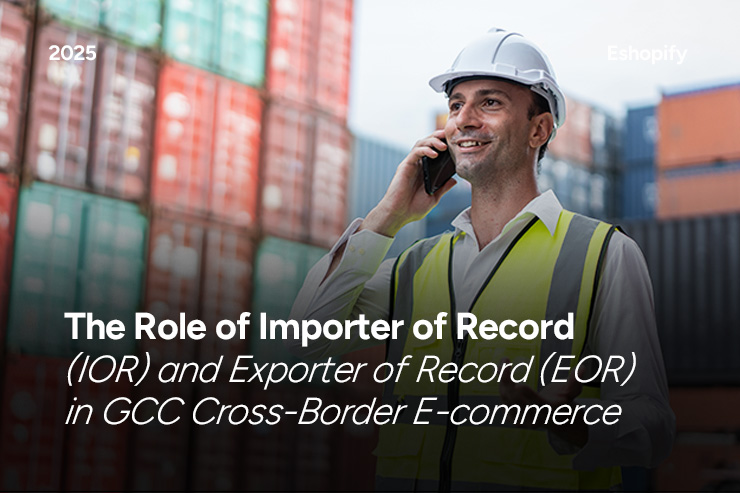 July 14, 2025 - By : man made marketing
July 14, 2025 - By : man made marketing
The GCC e-commerce market is booming, projected to surpass $50 billion by 2025 (source: Kearney Middle East). As global sellers race to capture this opportunity, cross-border trade is a major growth channel—but it comes with complex regulatory and customs challenges.
To navigate this successfully, businesses must understand and leverage the roles of the Importer of Record (IOR) and Exporter of Record (EOR)—two essential legal entities for international shipping.
This is where Eshopify Fulfillment plays a vital role. As a leading 3PL provider in the GCC, we offer full-spectrum services—from customs clearance to IOR/EOR-as-a-service, warehousing, and API-integrated logistics—empowering sellers to expand efficiently across UAE, Saudi Arabia, and beyond.
The Importer of Record (IOR) is the party legally responsible for importing goods into a country. This includes:
Product classification (using correct HS codes)
Filing customs documentation
Paying duties, VAT, and applicable fees
Ensuring full compliance with local laws and regulations
The Exporter of Record (EOR), on the other hand, manages the legal responsibilities on the exporting side. This includes:
Export documentation and declarations
Origin country compliance
Preparing commercial invoices and transport documents
These roles are essential to avoid penalties, shipment delays, or even seizure—especially in cross-border e-commerce, where shipments move quickly and frequently.
The GCC region—including the UAE, Saudi Arabia, Kuwait, Qatar, Bahrain, and Oman—has strict, country-specific import regulations, such as:
Requiring a local trade license or VAT registration for import clearance
Detailed product documentation and standardization approvals
Precise duty assessments based on HS code classification
Without a reliable IOR/EOR setup, shipments risk delays, rejection, or fines.
Furthermore, e-commerce sellers—especially non-resident Amazon or Shopify merchants—often lack a legal presence in the GCC. This makes it nearly impossible to act as their own IOR or EOR.
That’s why partnering with a local expert like Eshopify is crucial for frictionless trade.
Eshopify Fulfillment acts as your trusted logistics and compliance partner in the GCC. Here’s how we simplify the IOR/EOR burden:
We operate fulfillment centers in UAE Free Zones and Saudi Arabia, offering:
Centralized inventory for fast delivery
Same-day or next-day shipping to key GCC cities
Free Zone-to-mainland transitions for cross-border efficiency
We handle:
HS code mapping
Documentation and licensing
Duty and VAT processing
Connect your Amazon, Shopify, or other sales platforms with our fulfillment system for:
Real-time tracking
Automated order processing
Compliance status updates
We legally act as your IOR/EOR, ensuring:
Full regulatory compliance
No need to establish a local business
Faster customs processing and peace of mind
Case Example:
An electronics retailer from Europe selling via Amazon UAE saw shipment delays and customs holds due to lack of local representation. After partnering with Eshopify, we acted as their IOR, managed warehousing in Dubai, and integrated their order system. Result? 30% faster delivery times and zero customs rejections within three months.
Outsourcing your IOR/EOR needs to Eshopify unlocks multiple advantages:
Faster customs clearance through expert documentation and local representation
Avoidance of legal roadblocks—no need for costly local setup
Reduced penalties and duty optimization through proper classification
Improved customer satisfaction thanks to faster deliveries and efficient returns
Scalability across multiple GCC markets without operational friction
To ensure successful expansion, follow these tips:
Keep documentation accurate and complete – invoices, packing lists, HS codes, COO certificates
Know your product classifications – incorrect HS codes can lead to duty disputes
Use a reliable 3PL with IOR/EOR expertise – like Eshopify Fulfillment
Stay updated on GCC trade policies and Free Trade Zones
Leverage technology – real-time logistics and customs integration via API
The IOR and EOR aren’t just legal formalities—they’re the gatekeepers of success in GCC cross-border e-commerce. Navigating the region’s customs landscape without a trusted partner can lead to costly mistakes and growth bottlenecks.
With Eshopify Fulfillment, sellers get more than a 3PL—they gain a strategic partner who handles customs, warehousing, IOR/EOR, and delivery, all under one seamless system.
Book your FREE consultation with Eshopify Fulfillment today and get your cross-border operations running without the red tape!
Leave a comment